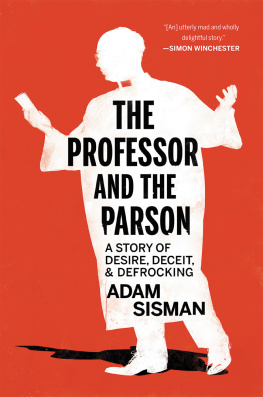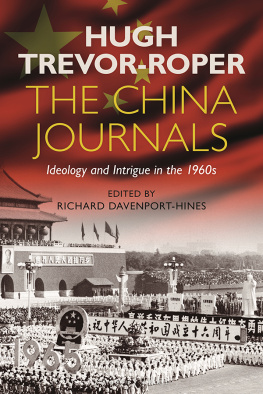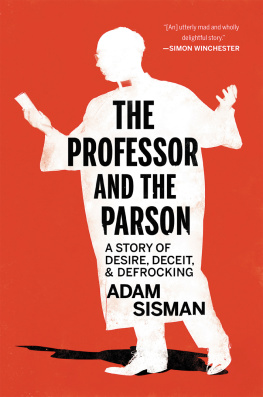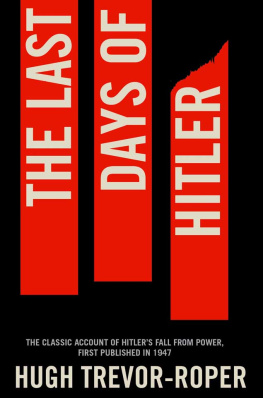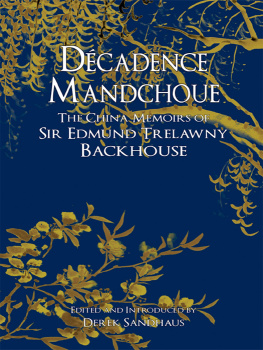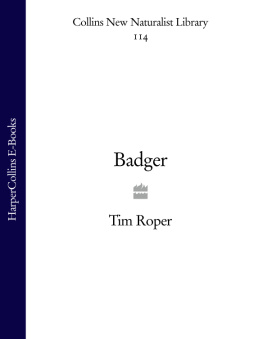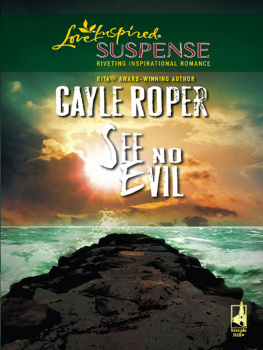Adam Sisman - An Honourable Englishman: The Life of Hugh Trevor-Roper
Here you can read online Adam Sisman - An Honourable Englishman: The Life of Hugh Trevor-Roper full text of the book (entire story) in english for free. Download pdf and epub, get meaning, cover and reviews about this ebook. year: 2011, publisher: Random House Publishing Group, genre: Detective and thriller. Description of the work, (preface) as well as reviews are available. Best literature library LitArk.com created for fans of good reading and offers a wide selection of genres:
Romance novel
Science fiction
Adventure
Detective
Science
History
Home and family
Prose
Art
Politics
Computer
Non-fiction
Religion
Business
Children
Humor
Choose a favorite category and find really read worthwhile books. Enjoy immersion in the world of imagination, feel the emotions of the characters or learn something new for yourself, make an fascinating discovery.

- Book:An Honourable Englishman: The Life of Hugh Trevor-Roper
- Author:
- Publisher:Random House Publishing Group
- Genre:
- Year:2011
- Rating:3 / 5
- Favourites:Add to favourites
- Your mark:
- 60
- 1
- 2
- 3
- 4
- 5
An Honourable Englishman: The Life of Hugh Trevor-Roper: summary, description and annotation
We offer to read an annotation, description, summary or preface (depends on what the author of the book "An Honourable Englishman: The Life of Hugh Trevor-Roper" wrote himself). If you haven't found the necessary information about the book — write in the comments, we will try to find it.
Adam Sisman: author's other books
Who wrote An Honourable Englishman: The Life of Hugh Trevor-Roper? Find out the surname, the name of the author of the book and a list of all author's works by series.
An Honourable Englishman: The Life of Hugh Trevor-Roper — read online for free the complete book (whole text) full work
Below is the text of the book, divided by pages. System saving the place of the last page read, allows you to conveniently read the book "An Honourable Englishman: The Life of Hugh Trevor-Roper" online for free, without having to search again every time where you left off. Put a bookmark, and you can go to the page where you finished reading at any time.
Font size:
Interval:
Bookmark:

Copyright 2010 by Adam Sisman
All rights reserved.
Published in the United States by Random House,
an imprint of The Random House Publishing Group,
a division of Random House, Inc., New York.
R ANDOM H OUSE and colophon are registered trademarks of Random House, Inc.
Originally published in the United Kingdom as Hugh Trevor-Roper: The Biography by Weidenfeld & Nicolson, a member of The Orion Publishing Group Ltd., London, in 2010.
eISBN: 978-0-679-60473-0
www.atrandom.com
Jacket design: Joe Montgomery
Jacket photograph: John Chillingworth/Stringer/
Hulton Archive/Getty Images
v3.1
I have written several biographies, though none until now about an individual whom I had met. But I did meet Hugh Trevor-Roper, and came to know him fairly well. Writing his life has therefore been a departure for me.
I first met him at an Oxford party in 1977. He was then sixty-three, and Regius Professor of Modern History, with a worldwide reputation. I was in my early twenties, and a junior editor with Oxford University Press. I had forgotten the circumstances of this meeting until almost thirty years later, when I found in the OUP archives a letter I wrote to him the next day. I do remember that I approached him cautiously, aware that he could be acerbic, but found him surprisingly affable. Subsequently I invited him to lunch with two of my colleagues, which turned out to be a stiff occasion. Only later did it occur to me that he might be shy, causing him to retreat behind a screen of reserve.
We were in sporadic contact over the next dozen years, as I pursued my early career in publishing. I came to know him better in the early 1990s, while I was writing my first book, a biography of A.J.P. Taylor. He granted me several interviews and gave me copies of his letters from Taylor. He also read and commented on my draft typescript. I was grateful that he made no attempt to dictate my account of those episodes in which he had participated, in particular his contest with Taylor to become Regius Professor in 1957. Your version is not my version, he said afterward, but you have every right to tell it in the way that seems true to you. He reviewed the book favorably when it was published in 1994. At the Oxford Union he and I re-enacted the debate between Taylor and Trevor-Roper over The Origins of the Second World War (I took Taylors part). By this time we had become friendly, and I visited him now and then at his house, the Old Rectory in Didcot. One cold winter morning I arrived to find Hugh and his wife Xandra in a state of agitated distress, as water from a burst pipe streamed down the wall of their dining room, damaging wallpaper and pictures. The plight of this elderly couple, by then both infirm, made a pathetic impression. Though no plumber, I climbed into the roof-space and succeeded in stopping the leak.
At some stage the possibility arose that I might write his life. Until recently I had persuaded myself that the proposal came from him, but correspondence in his archive indicates that it originated from me. (This has been a salutary reminder of the unreliability of memory.) In any case he welcomed this tentative suggestion. Im not sure if Im worth a biography, he said with feigned modesty, but if anyone is to write it, I should like it to be you. We made no formal agreement, but talked regularly about his past, and he offered me glimpses of his dauntingly voluminous archive. He introduced me to his friend and literary executor Blair Worden, who also encouraged me to write the book.
I last saw Hugh about ten days before his death. He was then in a hospice, and aware that the end was near, but he remained interested in the outside world to the last. What news, he would ask, from the Republic of Letters? I was never convinced that I was qualified to answer this question.
After Hughs death I was given exclusive access to the biographical materials in his archive, then at Didcot, now housed at Christ Church. These include letters, notebooks, diaries and a draft memoir of his early life: a rich mine for a biographer to quarry. The materials in the archive were supplemented by a succession of further finds, including hundreds of love letters between Hugh and Xandra, then married to another man, during their clandestine affaira correspondence of the most intimate and revealing nature. The letters emerged after Hughs death from drawers in both his desk and hers, including a cache discovered in a secret drawer by the sleuth Alan Bell. Another box of letters, this time to his mother, was found by Hughs stepdaughter Xenia Dennen at the bottom of a wardrobe when the house in Didcot was being cleared. Perhaps the most miraculous discovery of all was made by a college porter who rescued more than a hundred of Hughs uninhibited letters to an Oxford classicist (together with other treasures) from a Walton Street dumpster.
Hugh did not like being treated with too much reverence, and often quoted Gibbons preference for praise seasoned with a reasonable admixture of acid. He insisted that I should write whatever I liked, and his executors have given me a free rein. It is nevertheless possible that in writing Hugh Trevor-Ropers life I may have been influenced by feelings of loyalty, affection and gratitude. It would be false to deny the existence of such feelings. The reader must decide whether they have been a help or a hindrance to my understanding of his character.
Though I knew him as Hugh, this is not the only reason. He took the title Lord Dacre when he became a peer in 1979; I felt that it would be awkward to refer to my subject by one name for four-fifths of the book, and then by another for the remainder. There was a further difficulty, in that he continued to write under the name Hugh Trevor-Roper. It seemed simpler and clearer to refer to him as Hugh throughout.
I chose to entitle this edition of the book An Honourable Englishman, in response to a request from my American publishers for something less neutral than the bald British title Hugh Trevor-Roper. It might seem strange, perhaps even perverse, to characterize such a combative individual as honourable, though it seems to me an appropriate label for the man who accepted full responsibility for the disaster of the Hitler Diaries. I noticed that women in particular were inclined to describe him thus, which I found intriguing. One wrote to tell me that she had always very much liked and admired Hugh, but after reading my book she realized that he was an even more honourable and passionateas well of course as dazzlingly cleverman than I had thought.
There is another policy which may require explanation. A number of people who were important to Hugh are not mentioned in this book: for example, several of those younger friends who enlivened his last two decades. A book which listed all those who played a significant part in Hughs life would be tedious to read. In general, I took the view that individuals were as likely to feel relieved as they might be aggrieved to find their names not listed in the index.
The unreformed law of defamation has provided a further restraint. On legal advice I removed or modified a number of passages from my first draft. Informed readers may not be surprised to learn that a high proportion of these were taken from the chapters covering my subjects stint as Master of Peterhouse.
It has been my experience that historians, trained to be scrupulous about the use of evidence in their study of the past, are as susceptible to gossip as those in any other discipline. In researching this book I have been told certain stories which I have subsequently discovered to be untrue, and others which I suspect of being so. For example, it has been said that as a boy Hugh was not invited to childrens parties at Alnwick Castle, resulting in a permanent sense of exclusion, which manifested itself in a longing for social acceptance. This is one of those theories difficult to disprove; but what I do know makes me skeptical. For one thing, Hughs father Bertie was a respected member of local society. After the Duke of Northumberland he was the next person in the locality to own a car. He acted as family doctor to the ducal family, though discretion inhibited him from advertising the fact. So if there were parties for children of prominent local families, then the Trevor-Roper children were likely to have been invited. It is probable that they were not invited to the Christmas parties held at the Castle for the children of estate workers, but if so, this would not have been a cause for grievance. Far from being excluded, the Trevor-Roper family owned a key allowing them private access to the Castle grounds.
Font size:
Interval:
Bookmark:
Similar books «An Honourable Englishman: The Life of Hugh Trevor-Roper»
Look at similar books to An Honourable Englishman: The Life of Hugh Trevor-Roper. We have selected literature similar in name and meaning in the hope of providing readers with more options to find new, interesting, not yet read works.
Discussion, reviews of the book An Honourable Englishman: The Life of Hugh Trevor-Roper and just readers' own opinions. Leave your comments, write what you think about the work, its meaning or the main characters. Specify what exactly you liked and what you didn't like, and why you think so.

